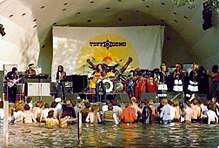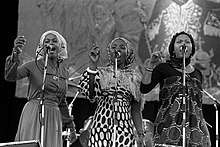Bob Marley and the Wailers
Bob Marley and the Wailers were a Jamaican reggae band led by Bob Marley. It developed from the earlier ska vocal group, the Wailers, created by Marley with Peter Tosh and Bunny Wailer in 1963. By late 1963 singers Junior Braithwaite, Beverley Kelso, and Cherry Smith had joined on. By the early 1970s, Marley and Bunny Wailer had learned to play some instruments and brothers Aston "Family Man" Barrett (bass) and Carlton Barrett (drums), had joined the band. After Bunny Wailer and Peter Tosh left the band in 1974, Marley began touring with new band members. His new backing band included the Barrett brothers, Junior Marvin and Al Anderson on lead guitar, Tyrone Downie and Earl "Wya" Lindo on keyboards, and Alvin "Seeco" Patterson on percussion. The "I Threes", consisting of Judy Mowatt, Marcia Griffiths, and Marley's wife, Rita, provided backing vocals.
Bob Marley and the Wailers | |
|---|---|
 Bob Marley and the Wailers performing at Crystal Palace, London (1980) | |
| Background information | |
| Also known as | Bob Marley & The Wailers, The Teenagers, The Wailing Rudeboys, The Wailing Wailers, The Wailers |
| Origin | Kingston, Jamaica |
| Genres | Reggae, ska, rocksteady, R&B |
| Years active | 1963–1981 |
| Labels | Studio One, Wail'n Soul'm, Tuff Gong, Beverley's, Upsetter, Island, JAD |
| Associated acts | Bob Marley, The Upsetters, Word, Sound and Power, The Wailers Band, The Original Wailers |
| Website | bobmarley |
| Past members | Bob Marley Peter Tosh Bunny Wailer Junior Braithwaite Cherry Smith Beverley Kelso Constantine Walker Aston Barrett Carlton Barrett Earl Lindo Tyrone Downie Rita Marley Marcia Griffiths Judy Mowatt Al Anderson Alvin Patterson Earl "Chinna" Smith Donald Kinsey Junior Marvin |
History
The Wailers were formed when self-taught musician Hubert Winston McIntosh (Peter Tosh) met the singers Neville Livingston (Bunny Wailer), and Robert Nesta Marley (Bob Marley) in 1963.
Early years
The lineup was known variously as the Teenagers, the Wailing Rudeboys, the Wailing Wailers and finally just the Wailers. The original lineup featured Junior Braithwaite on vocals, Bob Marley on guitar, Peter Tosh on keyboard, Neville Livingston (a.k.a. Bunny Wailer) on percussion, and Cherry Smith and Beverley Kelso on backing vocals. By 1966 Braithwaite, Kelso and Smith had left the band, which then consisted of the trio Livingston, Marley and Tosh.
In 1964, the Wailers topped the Jamaican charts with "Simmer Down", which was recorded 1963 at Studio One with the rhythm section from studio house band The Skatalites. Some of the Wailers' most notable songs were recorded with Lee "Scratch" Perry and his studio band the Upsetters. The Wailers also worked with renowned reggae producer Leslie Kong, who used his studio musicians called Beverley's All-Stars (Jackie Jackson, Paul Douglas, Gladstone Anderson, Winston Wright, Rad Bryan, Hux Brown) to record the songs that would be released as an album titled The Best of The Wailers.[1]
In 1966, they created a rocksteady record label, the Wail N Soul M.[2]
During the early 1970s the Upsetters members Aston "Family Man" Barrett and his brother Carlton (Carly) Barrett,[3] formed the Wailers Band, providing instrumental backing for The Wailers. The Wailers recorded groundbreaking ska and reggae songs such as "Simmer Down", "Trenchtown Rock", "Nice Time", "War", "Stir It Up" and "Get Up, Stand Up". An attempt at creating a full overview of all the music made by The Wailers prior to their signing to Island Records was made by the Roots Reggae Library.[4]
Line-up changes
The original Wailers line-up disbanded in 1974 due to Tosh and Livingston's refusal to play "freak clubs". The pair believed doing so would violate their Rastafarian faith.[5] Bob Marley formed Bob Marley and the Wailers with himself as guitarist, songwriter and main singer, the Wailers Band as the backing band, and the I Three as backup vocalists. The Wailers Band included the brothers Carlton Barrett and "Family Man" Barrett on drums and bass respectively, Junior Marvin and Al Anderson playing lead guitar, Tyrone Downie and Earl "Wya" Lindo playing keyboard, and Alvin "Seeco" Patterson playing percussion. The I Three consisted of Bob Marley's wife Rita Marley, Judy Mowatt and Marcia Griffiths.
Livingston believed that producer Chris Blackwell, whom he called "Chris Whiteworst", was responsible for the bad relationship between the band members, as he thought Blackwell released their albums under "Bob Marley and the Wailers" instead of "the Wailers" since 1969, which tested their friendship. Perry released two compilation albums for Trojan Records in 1974, Rasta Revolution and African Herbsman, which contained songs from Soul Rebels and Soul Revolution, respectively, and he was the copyright holder of several songs from these albums.[6] These changes caused a major dispute between Marley and Perry, when the former saw the albums, six months after their publication, in the Half Way Road in England.[7]
Later years
Bob Marley and the Wailers, Peter Tosh, and Bunny Wailer all enjoyed considerable success as reggae music continued to gain popularity during the 1970s and 1980s. One of the last performances that included Marley was in 1980 at Madison Square Garden. Several of the group's members have died subsequent to Marley's death in 1981: Carlton Barrett and Tosh (both murdered) in 1987, Braithwaite (also murdered) in 1999, Smith in 2008,[8] and Earl Lindo in 2017.[9] Bunny Wailer and Beverley Kelso are the only surviving members of the group's original line-up.
I Three

The I Three, commonly called I Threes, were formed in 1974 to support Bob Marley and the Wailers after Peter Tosh and Bunny Wailer – the original Wailer backing vocalists – left the band.
The three members were Marley's wife Rita Marley, Judy Mowatt and Marcia Griffiths.[10] Their name is intended as a spin on the Rastafarian "I and I" concept of the Godhead within each person.
Band members
|
|
Discography
- The Wailing Wailers (1965)
- Soul Rebels (1970)
- Soul Revolution (1971)
- The Best of The Wailers (1971)
- Catch a Fire (1973)
- Burnin' (1973)
- Natty Dread (1974)
- Rastaman Vibration (1976)
- Exodus (1977)
- Kaya (1978)
- Survival (1979)
- Uprising (1980)
- Confrontation (1983)
Tours
- Apr–Jul 1973: Catch a Fire Tour (England, USA)
- Oct–Nov 1973: Burnin' Tour (USA, England)
- Jun–Jul 1975: Natty Dread Tour (USA, Canada, England)
- Apr–Jul 1976: Rastaman Vibration Tour (USA, Canada, Germany, Sweden, Netherlands, France, England, Wales)
- May–Jun 1977: Exodus Tour (France, Belgium, Netherlands, Germany, Sweden, Denmark, England)
- May–Aug 1978: Kaya Tour (USA, Canada, England, France, Spain, Sweden, Denmark, Norway, Netherlands, Belgium)
- Apr–May 1979: Babylon by Bus Tour (Japan, New Zealand, Australia, Hawaii)
- Oct 1979 – Jan 1980: Survival Tour (USA, Canada, Trinidad/Tobago, Bahamas, Gabon, Zimbabwe)
- May–Sep 1980: Uprising Tour (Switzerland, Germany, France, Norway, Sweden, Denmark, Belgium, Netherlands, Italy, Spain, Ireland, England, Scotland, Wales, USA)
References
- Moskowitz, David V. (2007). "Rebel Music, 1970–1975." The Words and Music of Bob Marley. Westport, Connecticut, United States: Praeger. p. 23.
- "Wail'n Soul'm". Rate Your Music. Retrieved 5 August 2017.
- Lee Scratch Perry Interview, New Musical Express, 17 November 1984
- de Vries, Anton E. (2013). "The Wailers". roots-reggae-library.com. Retrieved 8 January 2015.
- (Marley 2012 by Magnolia Films)
- Timothy White (2 May 2006). Catch a Fire: The Life of Bob Marley. Henry Holt. pp. 222–223. Retrieved 17 May 2012.
- Timothy White (2 May 2006). Catch a Fire: The Life of Bob Marley. Henry Holt. p. 224. Retrieved 17 May 2012.
- "Archived copy". Archived from the original on 15 July 2011. Retrieved 24 October 2008.CS1 maint: archived copy as title (link)
- "Earl "Wyaa" Lindo dies at 64". IrieFm.net. 5 September 2017. Retrieved 6 September 2017.
- Harris, Craig. "Biography: I-Threes". Allmusic. Retrieved 24 July 2010.
Further reading
- Masouri, John (2007) Wailing Blues: The Story of Bob Marley's "Wailers" Wise Publications ISBN 1-84609-689-8
- Farley, Christopher (2007). Before the Legend: The Rise of Bob Marley, Amistad Press ISBN 0-06-053992-5
- Goldman, Vivien (2007) The Book of Exodus: The Making and Meaning of Bob Marley and the Wailers' Album of the Century Three Rivers Press ISBN 1-4000-5286-6
- Colin Grant (2011) The Natural Mystics : Marley, Tosh, Wailer, Jonathan Cape 978-0-224-08608-0 (U.K.), W.W. Norton & Company ISBN 978-0-393-08117-6 (U.S.)
External links
| Wikiquote has quotations related to: Bob Marley |